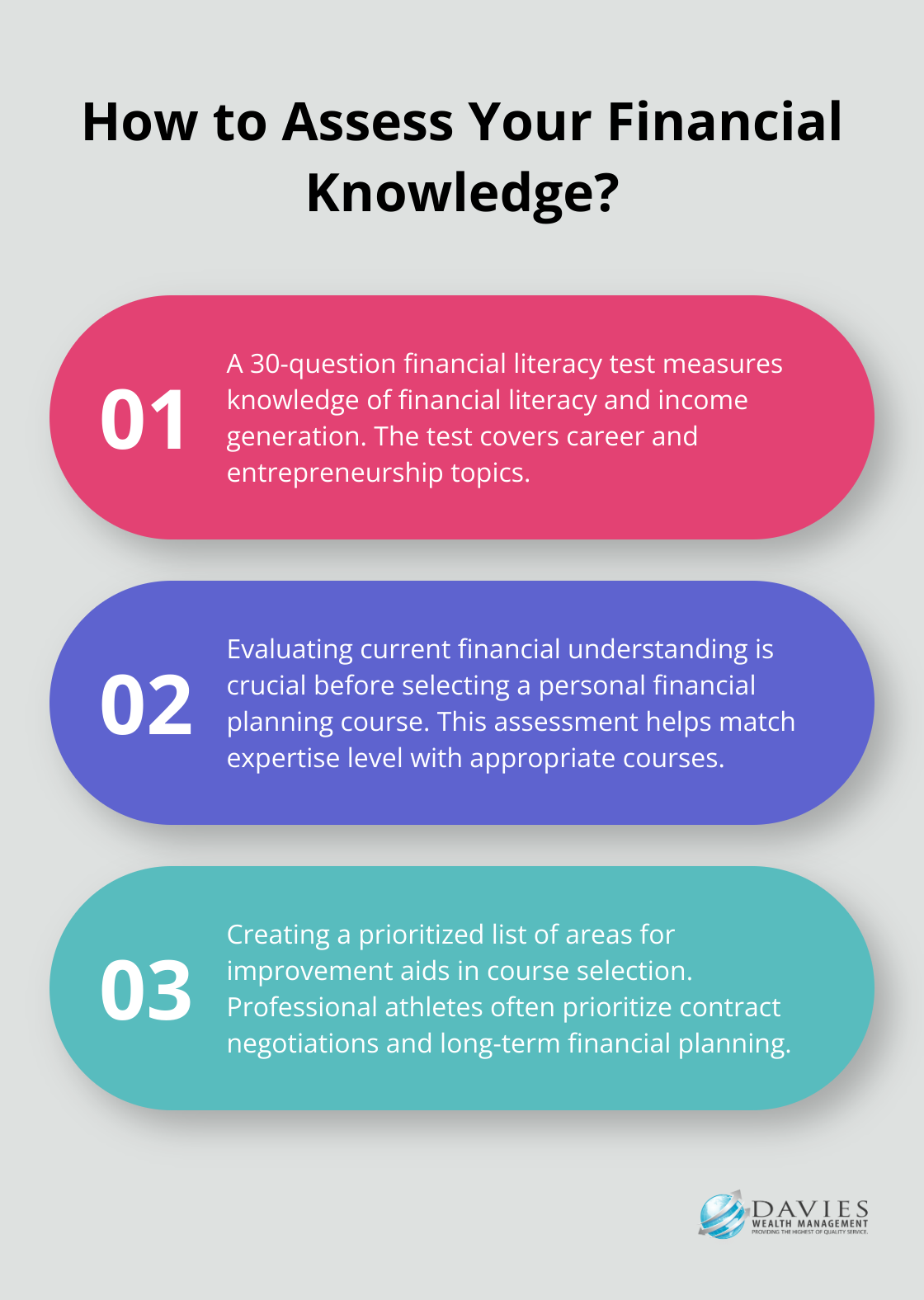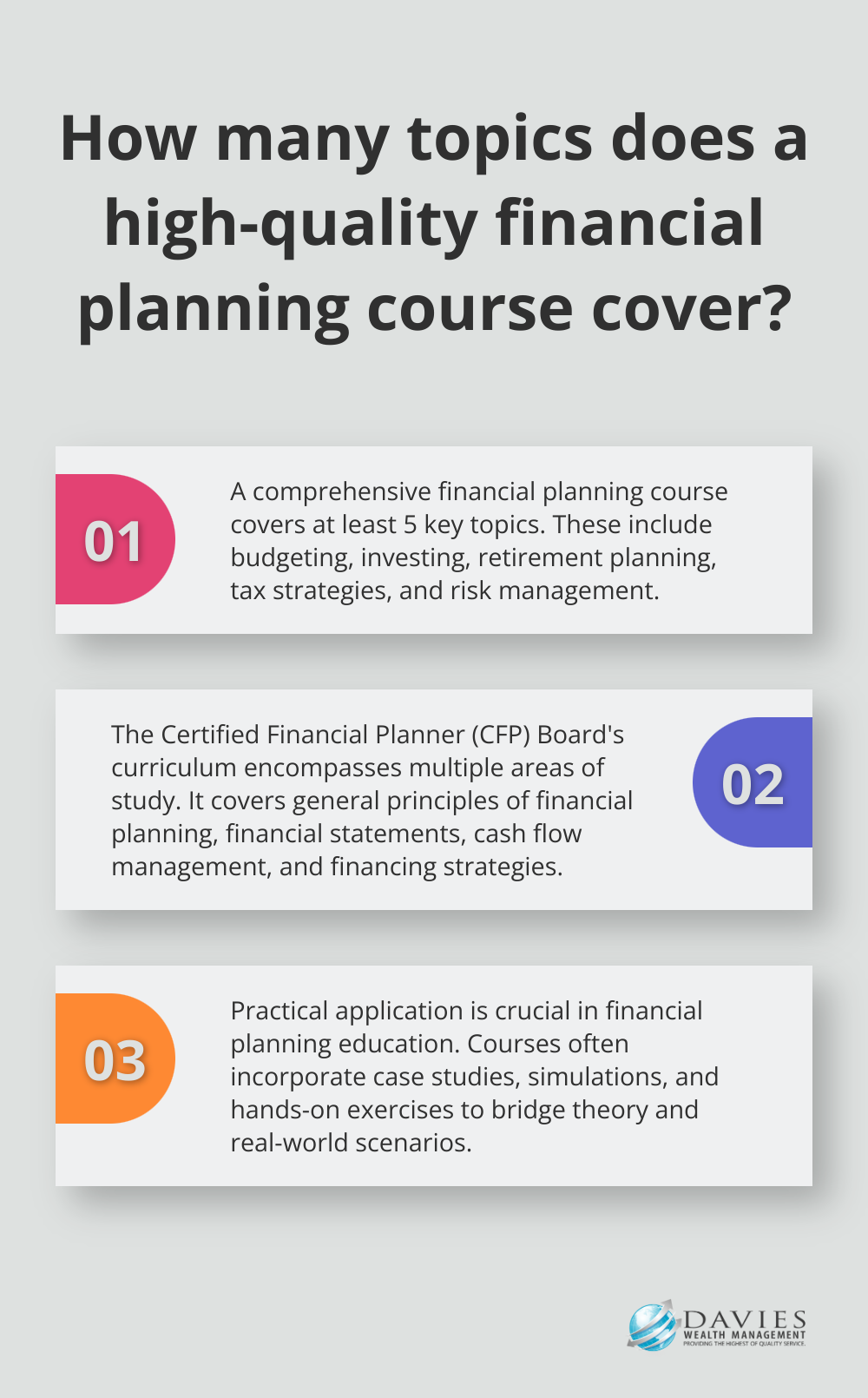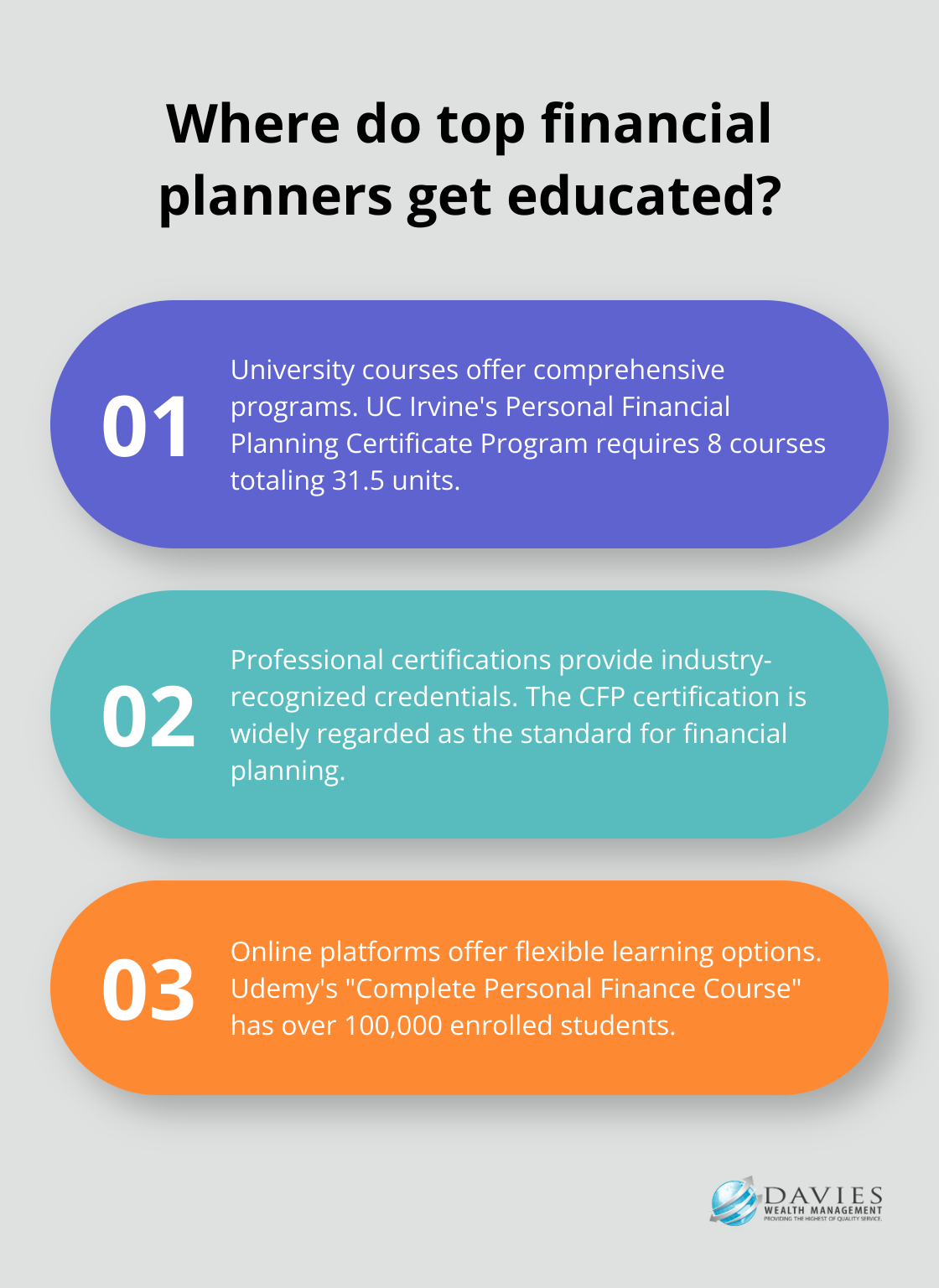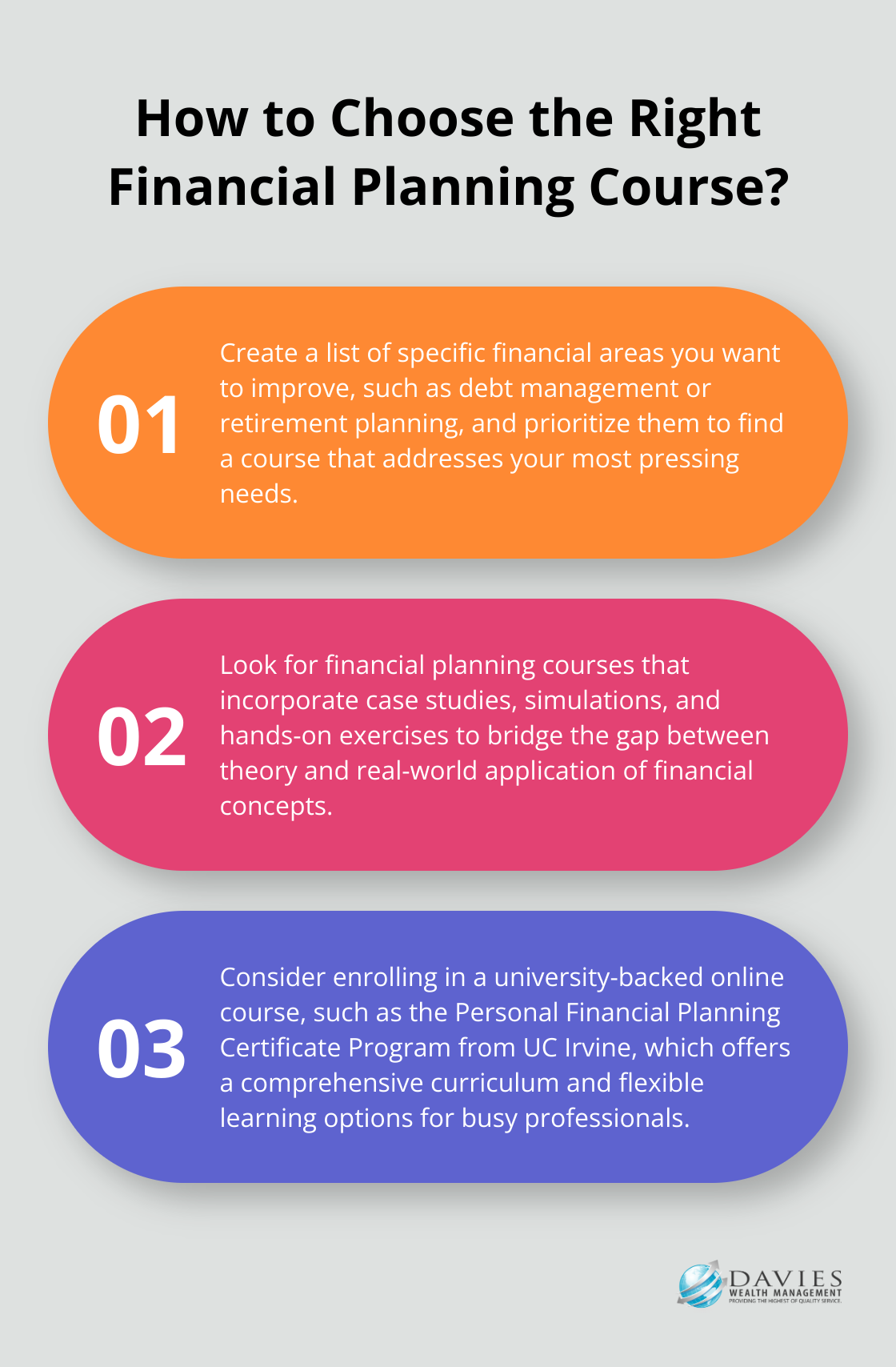At Davies Wealth Management, we understand the importance of financial education in achieving your long-term goals. Personal financial planning courses can be a game-changer in your journey towards financial success.
However, with countless options available, choosing the right course can be overwhelming. This guide will help you navigate the world of financial education and find the perfect course to suit your needs and aspirations.
What Are Your Financial Goals?
Assessing Your Financial Knowledge
Before you select a personal financial planning course, you must evaluate your current financial understanding. Ask yourself: Do you grasp basic concepts like budgeting and saving? Can you explain how investments function? Or are you starting from square one? Your honest assessment will guide you to a course that matches your expertise level.

A practical method to measure your knowledge is to take a free online financial literacy test. This 30-question test measures knowledge of financial literacy and income generation (career & entrepreneurship). Your score will provide a clear picture of your strengths and areas that need improvement.
Identifying Areas for Improvement
After you assess your knowledge, pinpoint specific areas you want to enhance. You might struggle with debt management or need to learn more about retirement planning. For professional athletes, understanding contract negotiations and long-term financial planning often take priority.
Create a list of these areas and prioritize them. This list will help you find a course that addresses your most pressing financial needs.
Setting Long-Term Financial Objectives
Consider your long-term financial goals. Are you saving for a house down payment? Do you plan to retire early? Or perhaps you’re a professional athlete aiming to secure your financial future beyond your playing career?
Your long-term objectives will significantly influence the type of financial planning course you should choose. For instance, if you focus on building wealth through investments, you’ll benefit from a course that thoroughly covers portfolio management and asset allocation strategies.
Aligning Goals with Course Selection
Once you’ve clarified your financial goals, you can align them with potential courses. Look for programs that specifically address your objectives. If retirement planning is your primary concern, seek out courses that emphasize this topic. For those interested in entrepreneurship, courses covering business finance and investment strategies might be more appropriate.
Remember, your financial goals may evolve over time. The course you choose should provide a solid foundation that allows for future growth and adaptation as your financial situation changes.
As you move forward in your search for the perfect financial planning course, keep these goals in mind. They will serve as your compass, guiding you towards educational opportunities that truly meet your needs and set you on the path to financial success. In the next section, we’ll explore the key features you should look for in a high-quality financial planning course.
What Makes a Great Financial Planning Course?
Comprehensive and Relevant Curriculum
A high-quality financial planning course must cover a wide range of topics. These include budgeting, investing, retirement planning, tax strategies, and risk management. The Certified Financial Planner (CFP) Board’s curriculum covers topics such as general principles of financial planning, financial statements, cash flow management, and financing strategies. This ensures a well-rounded education. Select courses that align with your specific needs, whether you’re a professional athlete planning for post-career finances or an entrepreneur seeking to manage business and personal wealth.
Practical Application and Real-World Scenarios
Theory is important, but the ability to apply knowledge to real-life situations is paramount. Choose courses that incorporate case studies, simulations, and hands-on exercises. Some courses offered by the Financial Planning Association (FPA) focus on behavioral finance issues and investor psychology, which can help in understanding decision-making processes. This practical approach helps bridge the gap between theory and real-world application.
Up-to-Date Content and Industry Trends
The financial world constantly evolves, with new regulations, investment products, and economic factors emerging regularly. Select a course that frequently updates to reflect current market conditions and financial trends. Courses that discuss recent developments (like cryptocurrency investments or changes in tax laws) demonstrate a commitment to providing current, relevant information.
Experienced and Qualified Instructors
The quality of instruction can make or break your learning experience. Opt for courses led by instructors with extensive real-world experience and relevant certifications. Instructors who hold CFP or Chartered Financial Analyst (CFA) designations often bring valuable insights from their professional practice.
Flexible Learning Options
Consider your learning style and schedule when choosing a course. Many reputable institutions offer a variety of formats, including in-person classes, online self-paced modules, and live virtual sessions. The American College of Financial Services provides both online and in-person options for their financial planning programs, catering to different learning preferences and time constraints. They are dedicated to furthering education in the financial services profession for the benefit of society.

As you evaluate these key features, you’ll be well-equipped to select a course that not only meets your current needs but also prepares you for future financial challenges. The next section will explore some of the top personal financial planning courses available, helping you narrow down your options and find the perfect fit for your educational journey.
Where to Find Top-Notch Financial Planning Courses
University-Backed Online Courses
Many prestigious universities now offer online financial planning courses. The University of California, Irvine provides a Personal Financial Planning Certificate Program. This comprehensive course awards a certificate upon successful completion of eight required courses totaling 31.5 units. It benefits those who want to gain a solid foundation in financial planning principles.

The University of Florida offers a Financial Planning and Wealth Management Specialization through Coursera. This program consists of five courses and a capstone project, providing an in-depth exploration of various financial planning aspects. The flexibility of online learning makes these university courses an excellent choice for busy professionals (including athletes juggling training schedules).
Professional Certification Programs
For those who seek industry-recognized credentials, professional certification programs stand out as the best option. The Certified Financial Planner (CFP) certification, offered by the CFP Board, is widely regarded as the standard for financial planning. CFP® professionals meet rigorous education, training, and ethical standards.
Another respected certification is the Chartered Financial Analyst (CFA) program, which proves particularly valuable for those interested in investment analysis and portfolio management. While these programs require a significant time commitment, they provide a comprehensive education and can greatly enhance career prospects in the financial sector.
Self-Paced Learning Platforms
Self-paced online learning platforms offer a variety of financial planning courses for those who prefer a more flexible approach. Platforms like Udemy and edX host courses from various instructors and institutions. For example, Udemy’s “The Complete Personal Finance Course: Save, Protect, Make More” has over 100,000 students enrolled and covers a wide range of financial topics.
These platforms often offer more affordable options and allow learners to progress at their own pace. However, it’s important to carefully review course content and instructor credentials to ensure you receive quality education.
In-Person Workshops and Seminars
For those who prefer face-to-face interaction, in-person workshops and seminars provide valuable learning opportunities. Local financial institutions, community colleges, and professional organizations often host these events. They offer the chance to engage directly with instructors and network with other participants (which can be particularly beneficial for those looking to expand their professional connections).
Financial Planning Software with Built-in Tutorials
Many financial planning software packages now include comprehensive tutorials and learning modules. These tools not only help you manage your finances but also educate you on various financial concepts as you use them. For example, Intuit for Education offers a free and flexible financial literacy program that uses real-world tools to learn about finances and build financial confidence.
Final Thoughts
Personal financial planning courses offer invaluable tools for achieving your financial goals. You will gain the knowledge and confidence to make sound financial decisions throughout your life. These courses provide more than just information; they equip you with strategies to navigate the ever-changing financial landscape.

The selection of the right course depends on your current knowledge, areas for improvement, and long-term objectives. Your choice will significantly impact your financial future. Ongoing financial education is essential to maintain and grow your wealth in today’s dynamic economic environment.
At Davies Wealth Management, we recognize the importance of financial education in building a secure future. We invite you to explore our wealth management services for personalized financial advice tailored to your unique situation. Our team of experts is ready to help you build, protect, and transfer your wealth with confidence.



Leave a Reply